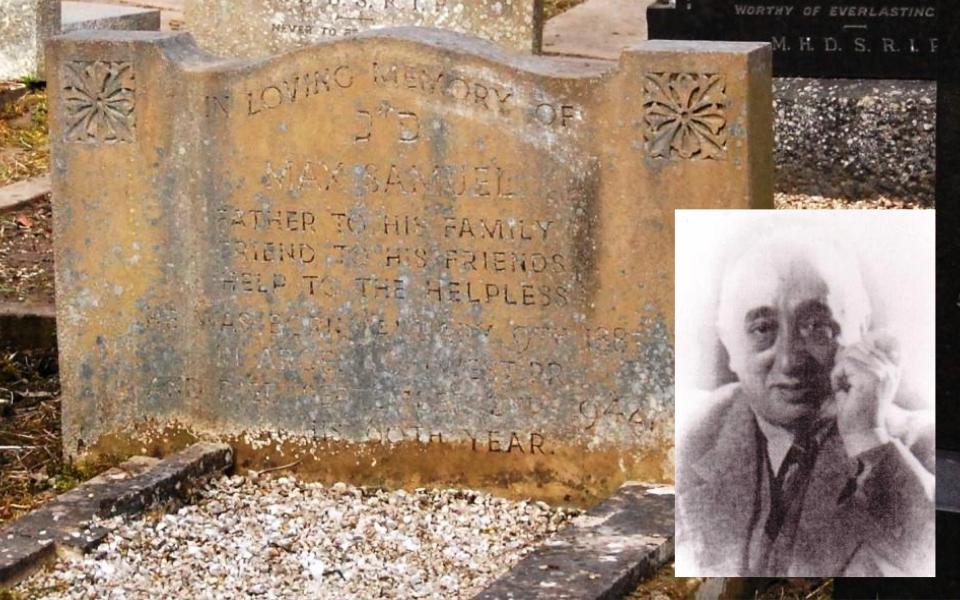
Published Monday 29 April 2019 at 15:57
A group from the Max-Samuel-Haus museum in northern Germany have paid tribute to the Jewish philanthropist and businessman by visiting his grave in Blackburn Old Cemetery.
Max Samuel is buried in the cemetery’s Jewish section along with some members of his family.
Born in 1883, the former manufacturer is celebrated in Germany for the financial help he gave to Jews fleeing Nazi Germany.
A distinguished member of the Jewish community in Rostock, in northern Germany, Samuel built a footwear factory in the town, employing at times up to 150 workers. He was a prominent business leader and in 1923 became Chairperson of Rostock’s Jewish community, and in 1930 Head of the Board of Deputies of Mecklenburg Jews, the provincial umbrella of Jewish communities.
In 1934, a year after the Nazis came to power, Samuel set up a Blackburn branch of his factory with members of his family in charge. Max, however, remained in Germany focussing his attention on protecting his fellow Jews and offering jobs to workers who had been dismissed because of their religion. Through his business he also provided loans to help finance their departure from an increasingly hostile Germany.
Samuel narrowly escaped arrest by the Nazi authorities, reluctantly leaving Germany only when it was no longer safe for him to remain. He came to Blackburn in 1938 when his footwear business in Rostock was seized by the Nazis, joining his family who had emigrated earlier, and working in the family business, EMSA Works and Herbert Appliance in Patterson Street, Blackburn.
In 2017 whilst researching the history of Jews buried in Blackburn Old Cemetery, Maurice Ffelan, a member of the Friends of Blackburn Old Cemetery – a voluntary group who care for the cemetery – discovered that the former home of Max Samuel in Rostock had become a Jewish museum. He sent them a photograph of his grave which led to last week’s visit.
Maurice said:
Having done some of my own research into Max Samuel, I was struck by how he had stayed in Germany for as long as he could while helping other Jews get enough money to leave. He was very reluctant to leave himself even though he must have realised that his activities were putting him at increasing risk from the Nazi authorities.
We are always interested to learn about the people buried in the cemetery and to hear from people who know their history, but it is an honour to learn more about a man who was forced to leave his homeland at such a dark time in his country’s history and chose to make his new home in Blackburn.
While in Blackburn this week, Dr Ulf Heinsohn and Steffi Katschke, researchers from Max-Samuel-Haus, also visited buildings in and around the town associated with Samuel, including the former site of his footwear manufacturing business.
Following the visits, Dr Ulf Heinsohn of the Max Samuel Haus museum gave a talk about Samuel’s life and achievements.
Dr Heinsohn commented:
For us the graves and sites of the Samuels in Blackburn and Darwen are important to complement our research on Max Samuel and his life and efforts, which he concluded here in Britain, as a philanthropist and promoter of democracy. But nor less important to us is his son Herbert, who by his donation created the charity of Max-Samuel-Haus. This has become the Rostock Jewish Heritage Centre, a meeting point and cultural venue for exhibitions, lectures, discussions, seminaries and research in the Rostock and further Mecklenburg Jews, their life and culture then and now. Through his donation, Herbert created an institution for Jewish Heritage and we want to honour Herbert and therefore research his life and efforts.
Max Samuel Haus is a foundation that aims to promote education about Jewish history and culture to address anti-Semitism and intolerance. It is located in the Samuel family’s former home in Rostock.
Filed under : Blackburn Old Cemetery | social integration
